Prémie Otto Wichterleho 2012
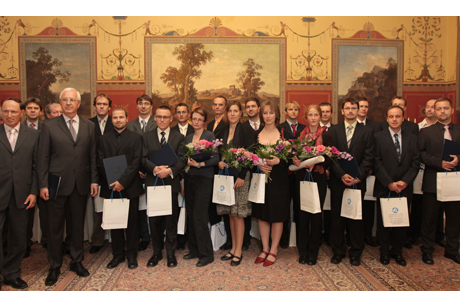
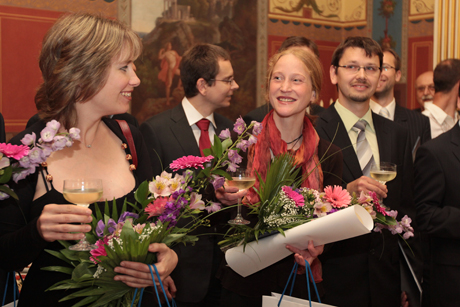

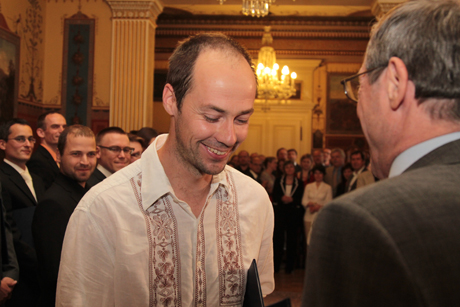
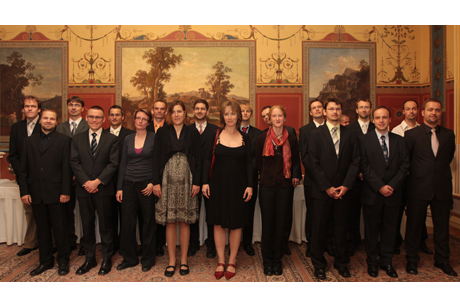
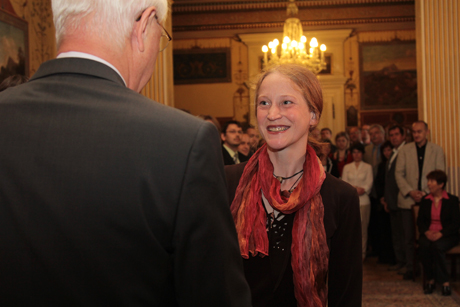
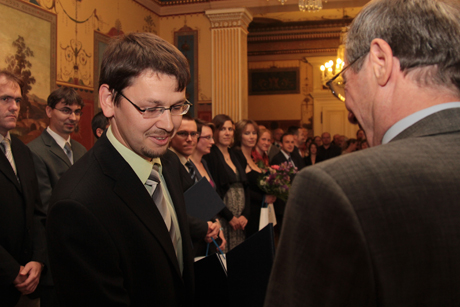
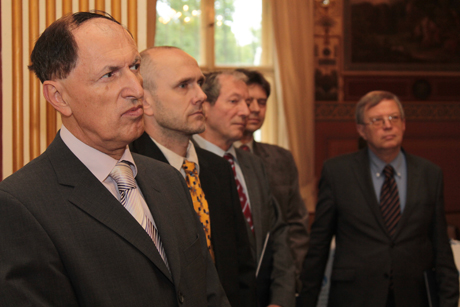

Do druhé dekády své existence vstoupily 13. června 2012 Prémie Otto Wichterleho, jež Akademie věd ČR každoročně uděluje vynikajícím a mimořádně talentovaným badatelům do 35 let, aby je podpořila v jejich budoucích kariérách. „Nositelé Wichterleho prémií z předchozích let si ve vědecké praxi vedou velmi zdatně. Když jsem si procházel laureáty z prvního ročníku, potěšilo mne, že mezi nimi byli tři budoucí nositelé nejvyššího ocenění AV ČR – Praemium Academiae, další tři se stali členy Učené společnosti a jeden působil jako ředitel akademického pracoviště. Získat Wichterleho prémii je tedy vstupem do vybrané společnosti,“ vyzdvihl předseda Akademie věd Jiří Drahoš, který v letošním, jedenáctém ročníku ocenil celkem 19 vědců z 16 akademických ústavů všech tří vědních oblastí. Ke slavnostnímu ceremoniálu v Lannově vile v pražské Bubenči se již po šesté připojila Cena časopisu 21. století, která pro jednoho z oceněných vědců s sebou nese prémii 100 000 korun; tentokrát ji získala Vendula Bohlen Šlechtová z Ústavu živočišné fyziologie a genetiky AV ČR, která patří k perspektivním badatelům Laboratoře genetiky ryb, kde se tvůrčím způsobem věnuje fylogenetice, fylogeografii, evoluci a molekulární taxonomii ryb převážně nadčeledi Cobitoidea i dalším palearktickým modelovým skupinám.
lsd
News
19 Jun 2015 Call for TV programmes or New Media productionsThe organizers of the The 2015 Science TV and New Media Festival are pleased to announce the Call for TV programmes or New Media productions for the 2015 European Science TV and New Media Festival and Awards. There is a significant expansion of the agenda this year and a change of format, with the festival and awards now combined as a single three day event in Lisbon, Portugal, from 23 to 25 November 2015. The venue will be the celebrated Sao Jorge theatre in the centre of Lisbon. There will be ten awards decided in Lisbon, and two further awards relating to young people and education decided by specific audiences Europe-wide, all listed below. The screenings will be complemented by panel led discussions and keynote talks on themes relating to Science and the TV/AV media. This year there will also be discussions after each screening of the productions shortlisted by the international jury. The Awards will be presented in Lisbon in a special evening on the third day of the event at the Jorge Theatre in central Lisbon, on 25 November.The deadline for entries is the end of June 2015. All entries must include a filled-in entry form and (apart from interactive video) a DVD. More information on http://europaws.org/.
more 17 Jun 2015 ERC celebrates 5,000th top researcher fundedEight years after its launch, the European Research Council (ERC) is celebrating a significant milestone: the funding of its 5,000th researcher. To mark this occasion, a debate in the European Parliament and a symbolic awarding of the grant took place June 16, 2015 in Brussels. The 5000th grantee, Dr Iva Tolić, is a leading Croatian cell biophysicist. An ERC Consolidator Grant will allow her to study the forces acting on the chromosomes during cell division. Her research could be critical for the development of new therapies against cancer. Dr Tolić will carry out her project at the Ruđer Bošković Institute in Zagreb. After receiving the news, she commented: "This ERC grant will make a big difference to me professionally. It will allow me to establish my new lab in Croatia, hire six team members and buy a state-of-the-art microscope. For the next five years, I will be able to focus purely on my research. I am very happy to be the 5000th ERC grantee."
more 16 Jun 2015 SYRIA – From Crony Capitalism to War Economy Oriental Institute of the Czech Academy of Sciences cordially invites you to a lecture on SYRIA – From Crony Capitalism to War Economy: The Economic Roots of the Current Crisis by Akram Kachee (Sciences Po, Lyon) on 23 June, 2015, 13:00–14:30 in Oriental Institute in Prague. Akram Kachee is an associate researcher in political science, GREMMO, France. His specialization is the Middle East and especially Syria, economy of war, and political opposition movements in Syria.
Oriental Institute of the Czech Academy of Sciences cordially invites you to a lecture on SYRIA – From Crony Capitalism to War Economy: The Economic Roots of the Current Crisis by Akram Kachee (Sciences Po, Lyon) on 23 June, 2015, 13:00–14:30 in Oriental Institute in Prague. Akram Kachee is an associate researcher in political science, GREMMO, France. His specialization is the Middle East and especially Syria, economy of war, and political opposition movements in Syria.
“The economic issues are crucial to our understanding of both the causes of the civil war in Syria and the functioning of the society since the conflict has begun. In order to get a better sense of the events in Syria, this presentation will show how the pre–2011 economic system forms a part of the genesis of the conflict while identifying actors and dynamics of the war economy.”
 Lecture by professor Halina Lichocka, Polish Academy of Sciences, about the participation of Czech scientists in the activities of the Academy of Sciences in Krakow, presented on 28 May 2015 at the National Technical Museum in Prague.
Lecture by professor Halina Lichocka, Polish Academy of Sciences, about the participation of Czech scientists in the activities of the Academy of Sciences in Krakow, presented on 28 May 2015 at the National Technical Museum in Prague.
A hand-written rescript of His Imperial and Royal Apostolic Majesty Franz Joseph I sparked off the preparatory works aimed at establishing an Academy of Sciences in Cracow. The rescript, written down in Vienna on May 2, 1871, was addressed to the Minister of Education Josef Jireček. The Emperor`s letter read as follows: « …My wish is to establish an Academy of Arts and Sciences in Cracow. I order you to be so kind as to start negotiations with the Cracow Scientific Society […], negotiations that will lead to the transformation of the Society into such an academy. I am awaiting respective motions to decide on them ».
The Association of Moravian institutes of the Czech Academy of Sciences that consists of the CAS institutes based in Brno and Ostrava and institutes that have detached units in Brno, Ostrava and the South Moravian Region, has prepared the well-arranged and detailed booklet with the information about the all CAS institutions in the Moravian region. You can download it here.
The Association of Moravian institutes of CAS was created by the Treaty of directors of institutions involved in the CAS on April 15, 2013. However, its roots are deeper, dating back to the Association of CAS Institutes founded on November 21, 2002. The aim of the association consists in particular in presentation, promotion and popularization of nonuniversity type of science and training in the basics of scientific work. It also seeks to coordinate interdisciplinary projects in CAS institutions in the Moravian region, it contributes to mutual awareness, cooperation and assistance to member institutes in organizational matters, consulting their common challenges and problems and presenting proposals and demands to the academy-level and other authorities. It also represents the member institutions with the municipal authorities of Brno and Ostrava, the South Moravian and Silesian Region, universities and media in the region.
Infections following joint-replacement surgeries: Europe’s orthopaedic experts consult on how to optimize prevention and therapy strategies
For all the advances being made in this discipline, postoperative infections remain a great challenge for orthopaedists and trauma surgeons. More than 7,000 experts from around the globe are gathering in Prague for the 16th EFORT Congress to consult on ways to optimise prevention and therapy for these dreaded complications. More information https://www.efort.org/prague2015/.
Scientific progress the past 150 years is highlighted in a new permanent exhibition at the Mendelianum Visitor Centre in Brno. Its focus is the publication in 1865 of Experiments in Plant Hybridization by Johann Gregor Mendel, the “Father of Genetics” and a world class scientist. The Mendelianum Centre is located on the premises where Mendel’s scientific society held its meetings. Visitors are given an insight into the world of genetics and molecular biology. The Mendelianium is a well-equipped laboratory that enables visitors to engage in numerous methods and laboratory techniques from the pollination of pea flowers to gene expression. This project aims to strengthen public interest in research in genetics and molecular biology and reveals the practical and social impact of discoveries in these two major areas.
more 12 Mar 2015 The Next Horizon of Technology AssessmentThe PACITA network, a network of TA institutions from across Europe, held its second European TA conference under the motto "The Next Horizon of Technology Assessment", aiming at taking stock of and supporting exchange on TA capacities available in Europe. The conference brought together for three days in Berlin a broad and diverse range of TA experts and others interested in critically reflecting the role of technology in society. They shared knowledge and experiences with various practices of technology assessment such as cross-disciplinary expert studies, stakeholder involvement, citizen consultation and parliamentary discourse, stimulating mutual learning of TA practitioners and researchers. The conference was organized by Karlsruhe Institute of Technology (ITAS/KIT) and the Technology Centre of the Academy of Sciences of the Czech Republic. More about project – http://berlinconference.pacitaproject.eu/
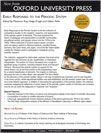 Oxford University Press recently published the work of Soňa Štrbáňová from the Institute for Contemporary History of the Academy of Sciences of the Czech Republic in the monograph Early Responses to the Periodic System. It is a comprehensive and timely reference. Oxford has generously arranged to make Early Responses to the Periodic System available to “friends and family” of the work at a special price for a limited time. You will receive 30% off the list price of $35.00! For more information or to take advantage of this exclusive discount, please visit https://global.oup.com/academic/help/ordering/?cc=cz&lang=en& and type promotion code: ASPROMP8 at check out.
Oxford University Press recently published the work of Soňa Štrbáňová from the Institute for Contemporary History of the Academy of Sciences of the Czech Republic in the monograph Early Responses to the Periodic System. It is a comprehensive and timely reference. Oxford has generously arranged to make Early Responses to the Periodic System available to “friends and family” of the work at a special price for a limited time. You will receive 30% off the list price of $35.00! For more information or to take advantage of this exclusive discount, please visit https://global.oup.com/academic/help/ordering/?cc=cz&lang=en& and type promotion code: ASPROMP8 at check out.
Following their election by the Scientific Council, Professors Sierd Cloetingh and Mart Saarma have been appointed new Vice Presidents of the European Research Council. This news was coupled with the European Commission's appointment today of three new members of the Scientific Council: Prof. Dame Janet Thornton, Prof. Fabio Zwirner and Head of the Department of Spintronics and Nanoelectronics Institute of Physics, Academy of Sciences of the Czech Republic & Professor at School of Physics and Astronomy University of Nottingham Prof. Tomáš Jungwirth.
more 8 Jan 2015 The Academy of Sciences celebrates its 125th Anniversary On January 23, 2015, The Academy of Sciences of the Czech Republic celebrates 125th Anniversary of establishment of Emperor Franz Josef’s Czech Academy for Sciences, Literature and the Arts – its own ancestor that became in 1952 together with other scientific institutes the pedestal for Czechoslovak Academy of Sciences.
On January 23, 2015, The Academy of Sciences of the Czech Republic celebrates 125th Anniversary of establishment of Emperor Franz Josef’s Czech Academy for Sciences, Literature and the Arts – its own ancestor that became in 1952 together with other scientific institutes the pedestal for Czechoslovak Academy of Sciences.
 In the solidarity with other European states opposed to all terrorist attacks, the Czech Academy of Sciences expresses its condolences for the victims of the outrages in France January 2015.
In the solidarity with other European states opposed to all terrorist attacks, the Czech Academy of Sciences expresses its condolences for the victims of the outrages in France January 2015.
 After the St Maurus reliquary, that is a national cultural monument and one of the greatest treasures of the Czech Republic, the Bečov castle takes pride in unique collection of 136 bottles of wine, cognac and Champagne that mostly originate from the 1890s. The value of old bottles that were uncovered together with the medieval St Maurus reliquary in the Bečov nad Teplou castle in 1985 has been put at 20 million Kč. Many bottles in collection have preserved labels therefore, it can be determined not only the origin but also the concrete wine grower who produced the wine and the dealer who sold it. Each bottle has a value of minimum 200,000 Kč and it is probably the most valuable find of wine in the Czech Republic. The treasure is kept in a special depository at the Bečov castle.
After the St Maurus reliquary, that is a national cultural monument and one of the greatest treasures of the Czech Republic, the Bečov castle takes pride in unique collection of 136 bottles of wine, cognac and Champagne that mostly originate from the 1890s. The value of old bottles that were uncovered together with the medieval St Maurus reliquary in the Bečov nad Teplou castle in 1985 has been put at 20 million Kč. Many bottles in collection have preserved labels therefore, it can be determined not only the origin but also the concrete wine grower who produced the wine and the dealer who sold it. Each bottle has a value of minimum 200,000 Kč and it is probably the most valuable find of wine in the Czech Republic. The treasure is kept in a special depository at the Bečov castle.
Villa Lanna in Prague is one of the architectural jewels of the Academy of Sciences of the Czech Republic. Last year, the editorial staff of Academic bulletin prepared a Czech supplement for the Academy’s official magazine which recognized the importance of the villa by publishing detailed imagery of the interiors and scientific article devoted to its interesting history of the building and offered a private view into a life of one of the most renowned philanthropist of arts of the end of 19th century in the Austria-Hungary Empire.
more 19 Nov 2014 Call for Applications SozialMarie 2015 SozialMarie is the oldest prize for social innovation in Europe and honours since 2005 every year 15 outstanding projects in the field of social innovation. Beyond a financial recognition adding up to 54,000 Euros, SozialMarie primarily offers a public platform for projects that by means of new approaches provide innovative answers to societal challenges. The application period 2015 starts on Monday 10th of November 2014. Complete application form must be submitted online on SozialMarie’s website on 27th of January 2015 at 24:00 at the latest. More information http://www.sozialmarie.org/.
SozialMarie is the oldest prize for social innovation in Europe and honours since 2005 every year 15 outstanding projects in the field of social innovation. Beyond a financial recognition adding up to 54,000 Euros, SozialMarie primarily offers a public platform for projects that by means of new approaches provide innovative answers to societal challenges. The application period 2015 starts on Monday 10th of November 2014. Complete application form must be submitted online on SozialMarie’s website on 27th of January 2015 at 24:00 at the latest. More information http://www.sozialmarie.org/.
The Polish Minister of Science and Higher Education Professor Lena Kolarska-Bobińska and ESO’s Director General Tim de Zeeuw signed an agreement (28 October 2014) that will lead to the country joining the European Southern Observatory (ESO) — the world’s most productive ground-based observatory. Since this agreement means accession to an international treaty, it must now be submitted to the Polish Parliament for ratification. The signing of the agreement followed its unanimous approval by the ESO Council during an extraordinary meeting on 8 October 2014.
more 24 Oct 2014 New members for the International Selection Committee of the Millennium Technology Prize In its meeting on October 14, 2014, the Board of Technology Academy Finland decided to appoint two new members to the International Selection Committee of the Millennium Technology Prize. The new members are Professor Sir Peter Knight from Imperial College London, and Research Professor Merja Penttilä from Technical Research Centre of Finland VTT. The appointment of new members is made at the presentation of the Aalto University, the strategic partner of TAF with the Millennium Technology Prize.
In its meeting on October 14, 2014, the Board of Technology Academy Finland decided to appoint two new members to the International Selection Committee of the Millennium Technology Prize. The new members are Professor Sir Peter Knight from Imperial College London, and Research Professor Merja Penttilä from Technical Research Centre of Finland VTT. The appointment of new members is made at the presentation of the Aalto University, the strategic partner of TAF with the Millennium Technology Prize.
Astronomy & Astrophysics has recently published the spectacular discovery of meteorite fragments 20 years after the corresponding bolide has been seen in the skies of the Czech Republic. This discovery was made possible by reanalysing the trajectory, which moved the impact line by 330 meters. Interestingly, the meteorites found on the ground are of different types, pointing to a parent asteroid of heterogeneous composition.
more 7 Oct 2014 1989: Thinking Revolution in East-Central Europe International conference organized by the Department for the Study of Late Socialism and Post-Socialism of the Institute of Contemporary History of the ASCR and the Department for the Study of Modern Czech Philosophy of the Philosophy Institute of the ASCR was held October 2–3, 2014 at Villa Lanna in Prague. 1989 was a year of democratic revolutions and the fall of “real socialism” in Central Europe. Did it signal the end of revolutionary regimes and the beginning of a “restoration,” or rather the replacement of worn-out communist revolutions with a new, neoliberal revolution? Or, considering the nonviolent character of the events, did they really constitute a revolution at all?
International conference organized by the Department for the Study of Late Socialism and Post-Socialism of the Institute of Contemporary History of the ASCR and the Department for the Study of Modern Czech Philosophy of the Philosophy Institute of the ASCR was held October 2–3, 2014 at Villa Lanna in Prague. 1989 was a year of democratic revolutions and the fall of “real socialism” in Central Europe. Did it signal the end of revolutionary regimes and the beginning of a “restoration,” or rather the replacement of worn-out communist revolutions with a new, neoliberal revolution? Or, considering the nonviolent character of the events, did they really constitute a revolution at all?
 Nitrite-oxidizing bacteria are key players in the natural nitrogen cycle on Earth and in biological wastewater treatment plants. For decades, these specialist bacteria were thought to depend on nitrite as their source of energy. An international team of scientists led by Holger Daims, a microbiologist at the University of Vienna, has now shown that nitrite-oxidizing bacteria can use hydrogen as an alternative source of energy. The oxidation of hydrogen with oxygen enables their growth independent of nitrite and a lifestyle outside the nitrogen cycle. The study is published in the current issue of the journal "Science".
Nitrite-oxidizing bacteria are key players in the natural nitrogen cycle on Earth and in biological wastewater treatment plants. For decades, these specialist bacteria were thought to depend on nitrite as their source of energy. An international team of scientists led by Holger Daims, a microbiologist at the University of Vienna, has now shown that nitrite-oxidizing bacteria can use hydrogen as an alternative source of energy. The oxidation of hydrogen with oxygen enables their growth independent of nitrite and a lifestyle outside the nitrogen cycle. The study is published in the current issue of the journal "Science".

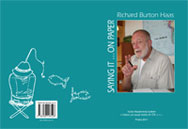













 Česky
Česky
